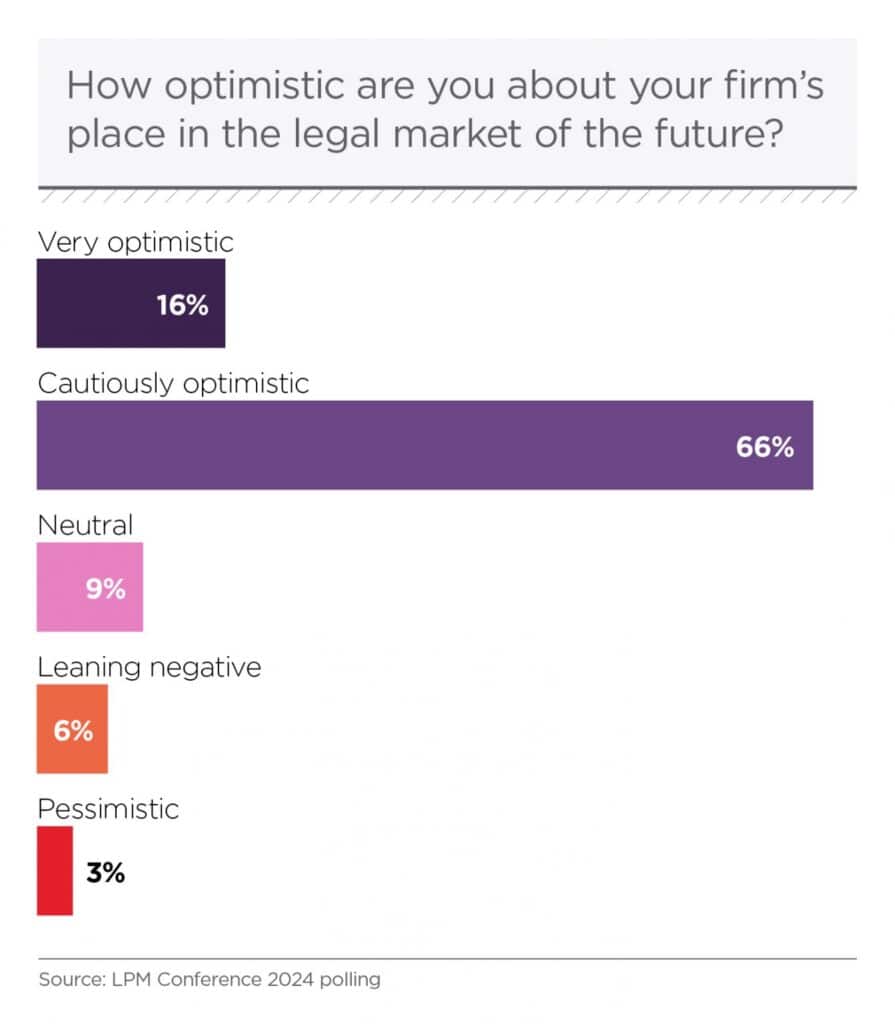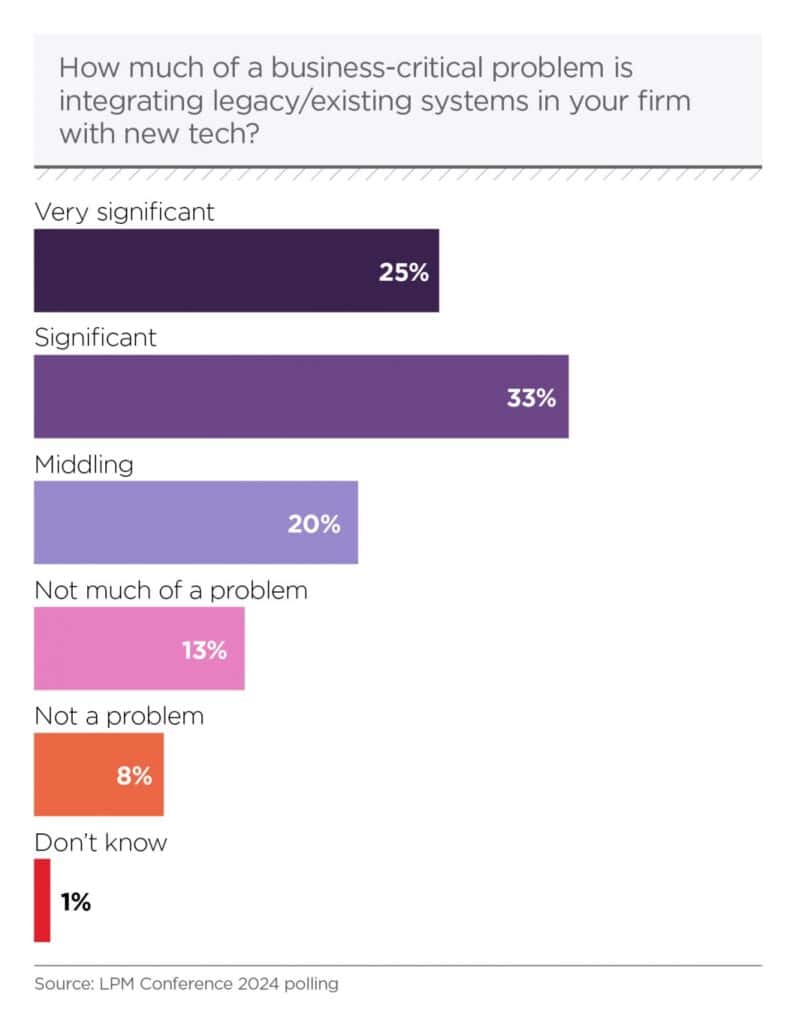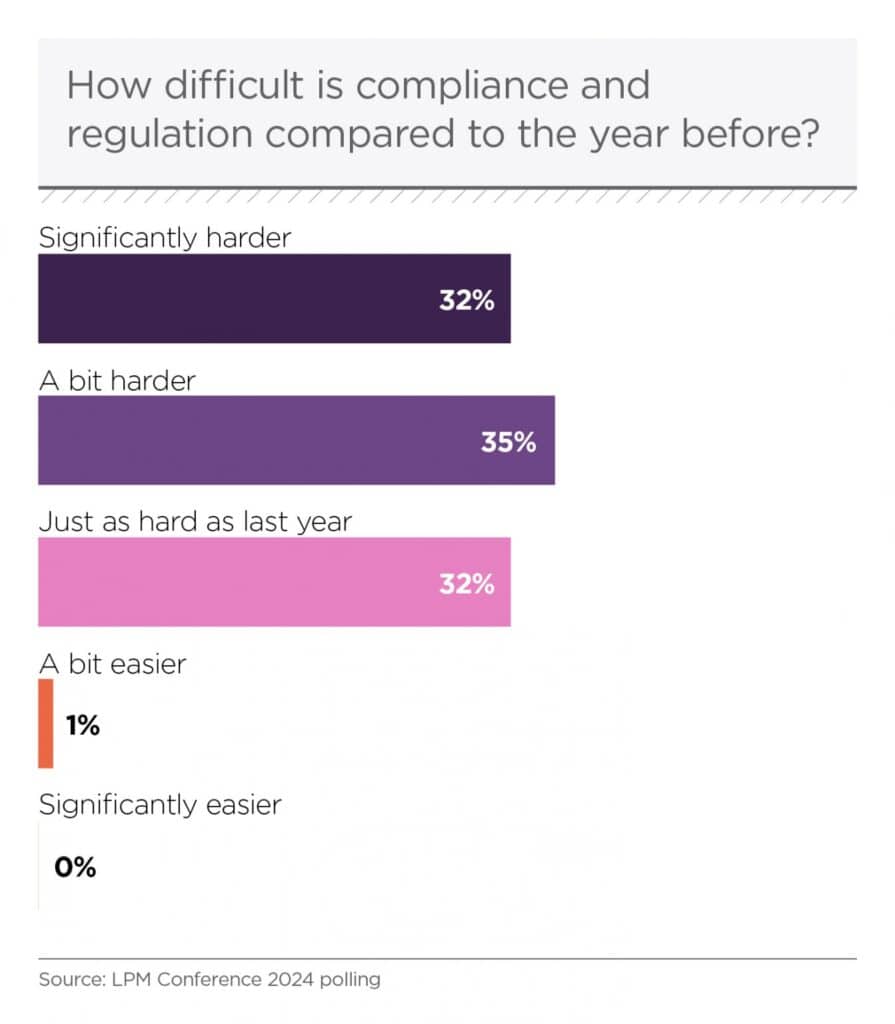Contents
Shaping the future of SME law firms: Insights from 2024 LPM Conference Polls
The future of SME law firms holds significant promise, as suggested in the 2024 LPM conference polls. While economic pressures persist, most leaders of small and mid-sized law firms are optimistic about the path forward.
Osprey Approach was honoured to contribute to the LPM report and support this year’s conference, where leaders from over 70 firms discussed key issues affecting the sector, including talent recruitment, technology transformation, and compliance.
Here, we examine the results of the law firm leader poll and explore how these trends might shape the SME legal landscape in 2024 and beyond.
Balancing optimism with market realities
Polling from the conference showed that 80% of SME legal leaders feel positive about their firm’s prospects. However, this optimism is tempered by awareness of growing challenges, with 65% reporting increased pressures in areas like talent, technology, and compliance this year.
SME firms are hopeful that clear business policies from the new government will help stabilise the market. But, as highlighted in the LPM conference report, sustainable growth requires strategies that actively address today’s pressures. Leaders agree that proactive approaches to talent shortages, cost controls, and evolving client demands will be critical for firms looking to remain competitive.

At Osprey, we understand that while optimism is essential, it needs to be supported by practical solutions. We encourage firms to address talent retention, technological transformation, and rising operational costs now to position themselves for future success. By focusing on efficient workflows, robust systems, and clear strategies, firms can better navigate these challenges.
Attracting talent in a changing legal market
Attracting and retaining skilled professionals is the top concern for most firms, with 39% of leaders citing it as their primary challenge. In a competitive hiring market where candidates increasingly prioritise work-life balance over salary alone, SME firms have an opportunity to differentiate themselves through a focus on culture, values, and flexible work options.
In the report, Emma Sell, COO of Fox & Partners, noted that her firm has seen interest from lawyers at larger firms who are drawn to SME firms’ potential for better work-life balance. This signals that SMEs may attract high-calibre talent by promoting a workplace culture that supports flexibility and growth.
At Osprey, we recognise the importance of operational efficiency in attracting and retaining talent. By providing tools that automate administrative tasks, firms can reduce burnout and create a more attractive, flexible working environment for their teams. This allows firms to focus on what really matters—building a supportive and thriving workplace culture.
Assessing generative AI’s potential in legal services
Generative AI (gen AI) featured prominently in discussions, with over half of SME leaders predicting it will significantly impact legal service delivery and operations within the next two years. Although some firms are cautiously adopting tools like Microsoft’s Copilot to handle administrative tasks, perspectives on AI adoption remain varied.
In the report, Zoe Bailey from IP law firm Withers & Rogers shared that gen AI has been helpful for administrative tasks, freeing up staff for higher-value work. However, Brian Inkster of Inksters suggests caution, noting that the practical benefits of gen AI remain to be fully seen. Osprey encourages a balanced approach to AI adoption, recommending that firms assess where automation can best add value to support clients and staff.
Osprey also believes that the implementation of generative AI must be strategic, with careful consideration of where it can be used most effectively. By integrating AI into administrative functions or document review processes, firms can optimise operations without losing sight of the importance of personal client relationships and attention to detail.

Integrating technology in a legacy-heavy sector
A common challenge identified in the report was integrating new technology with legacy systems, with 58% of leaders marking it as a critical issue. Complex technology stacks can create inefficiencies, limit flexibility, and hinder effective service delivery.

Osprey’s practice, accounting and case management software offers an all-in-one solution designed to simplify these challenges, minimising the issue of “shelfware”–unused tools that can become costly and disruptive. We provide ongoing support to help firms maximise their technology investments, allowing them to concentrate on client service and operational efficiency.
Osprey’s solutions are specifically designed to address these legacy system integration issues. By offering seamless, intuitive systems that connect and communicate effectively, we help law firms streamline their workflows and eliminate redundancies. This approach ensures that technology enhances rather than complicates the work of SME firms, leading to better outcomes for both clients and staff.
Meeting growing compliance requirements
Compliance pressures have risen significantly, now ranking as the third most pressing concern in the sector, compared to only 6% last year. With regulatory requirements expanding, SME law firms feel increasing scrutiny from the Solicitors Regulation Authority (SRA).
In the report,Seema Jones of Town Legal noted that regulatory “grey areas” can cause confusion, leading firms to interpret guidelines in different ways. Smaller firms, while agile, often lack the resources to manage complex compliance effectively.

At Osprey, we believe that adopting a centralised system for compliance management can help mitigate risks and ensure that firms remain in full compliance. By connecting key processes and data points through a single platform, firms can manage regulatory requirements more efficiently, reducing the potential for mistakes or oversights. This holistic approach ensures a more streamlined and proactive approach to compliance management.
Planning for resilience and growth
The findings of LPM conference poll highlight that SME law firms that are ready to embrace change will be best positioned for growth. The road ahead will require targeted investment in compliance, technology integration, and talent retention. But as the LPM conference revealed, these goals are within reach.
Osprey is committed to supporting SME law firms in building sustainable practices, streamlining operations, and fostering positive workplace cultures. As firms navigate the evolving market, we’re here to help them transform challenges into future strengths.
At Osprey, we are dedicated to empowering firms with the tools and insights they need to remain resilient. From integrating technology solutions to refining workflows and fostering a culture of continuous improvement, we are with law firms every step of the way. Together, we can turn today’s obstacles into tomorrow’s opportunities.
For a deeper look into the trends shaping SME law firms, explore the full LPM conference report —a valuable resource for firms charting their future success.


